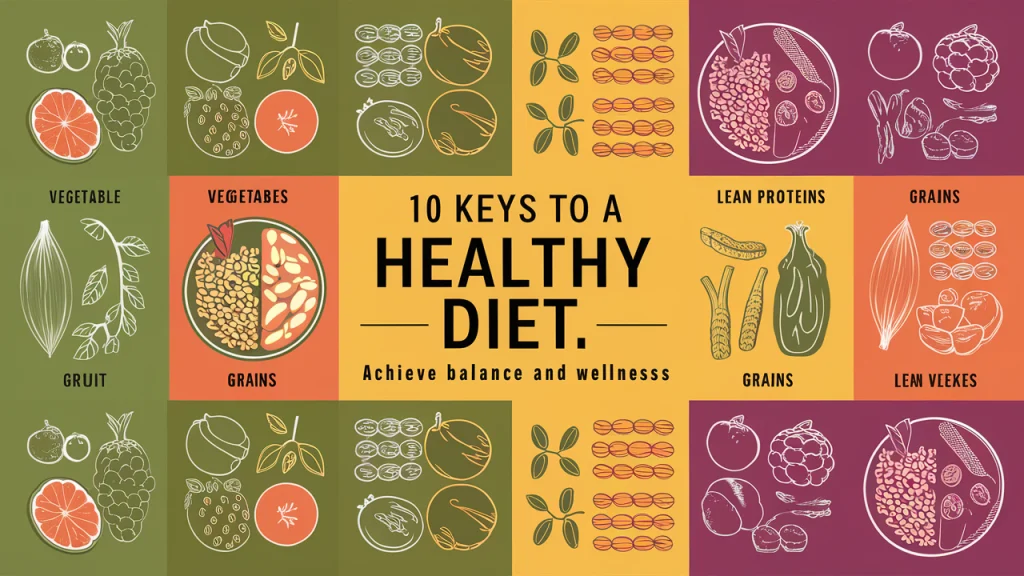Maintaining a healthy diet is essential for overall well-being, promoting energy, improving mood, and reducing the risk of chronic diseases. This article outlines ten fundamental keys to achieving and sustaining a healthy diet.
1. Balance Your Macronutrients

A balanced diet includes a proper ratio of carbohydrates, proteins, and fats. Each macronutrient plays a crucial role in body function:
- Carbohydrates: Primary energy source; choose whole grains over refined carbs.
- Proteins: Essential for muscle repair and growth; includes lean meats, fish, beans, and legumes.
- Fats: Necessary for hormone production and brain function; focus on healthy fats like avocados, nuts, and olive oil.
2. Prioritize Whole Foods

Whole foods are minimally processed and rich in nutrients:
- Fruits and Vegetables: Aim for a variety of colours to ensure a range of vitamins and minerals.
- Whole Grains: Brown rice, quinoa, oats, and whole wheat products provide fibre and essential nutrients.
- Lean Proteins: Fresh fish, poultry, eggs, and plant-based proteins.
3. Control Portion Sizes

Managing portion sizes helps prevent overeating and maintain a healthy weight:
- Use smaller plates to help control portions.
- Pay attention to hunger and fullness cues.
- Avoid eating straight from packages.
4. Stay Hydrated

Hydration is vital for bodily functions:
- Drink at least eight 8-ounce glasses of water a day.
- Limit sugary drinks and opt for water, herbal teas, and infused water with fruits or herbs.
5. Reduce Sugar Intake

Excessive sugar consumption can lead to various health issues:
- Cut back on sugary snacks, beverages, and desserts.
- Read labels to identify hidden sugars in processed foods.
- Use natural sweeteners like honey or stevia in moderation.
6. Limit Processed Foods

Processed foods often contain unhealthy additives:
- Choose fresh or frozen fruits and vegetables over canned ones.
- Cook from scratch to control ingredients.
- Avoid foods high in trans fats, artificial preservatives, and high sodium content.
7. Include Healthy Snacks

Healthy snacks keep energy levels stable and prevent overeating at meals:
- Opt for fruits, nuts, yogurt, and vegetable sticks.
- Prepare snacks in advance to avoid reaching for unhealthy options.
8. Eat Mindfully

Mindful eating enhances the eating experience and aids digestion:
- Focus on your food by eliminating distractions.
- Chew thoroughly and savor each bite.
- Eat slowly to recognize satiety signals.
9. Plan Your Meals

Meal planning ensures balanced and nutritious meals:
- Create a weekly meal plan to include all food groups.
- Prepare grocery lists based on your meal plan.
- Batch cook and freeze meals for convenience.
10. Monitor Nutrient Intake

Ensure you’re getting adequate vitamins and minerals:
- Consider a multivitamin if necessary, after consulting with a healthcare provider.
- Regularly consume foods rich in essential nutrients like calcium, iron, and vitamins D and B12.
Conclusion
These ten keys to a healthy diet can significantly improve overall health and well-being. Balance, variety, and mindful eating are crucial to a nutritious diet. Implementing these practices can lead to sustainable, long-term health benefits.
FAQs
1. What are macronutrients and why are they important?
– Macronutrients include carbohydrates, proteins, and fats, each playing a vital role in providing energy, supporting growth, and maintaining bodily functions.
2. How can I control portion sizes effectively?
– Use smaller plates, pay attention to hunger cues, and avoid eating directly from packages to manage portion sizes effectively.
3. Why is hydration important for a healthy diet?
– Proper hydration is crucial for bodily functions, including digestion, nutrient absorption, and maintaining energy levels.
4. What are some healthy snack options?
– Healthy snack options include fruits, nuts, yogurt, and vegetable sticks, which help keep energy levels stable between meals.
5. How can meal planning benefit my diet?
– Meal planning ensures balanced meals, saves time, and reduces the temptation to opt for unhealthy food choices.


